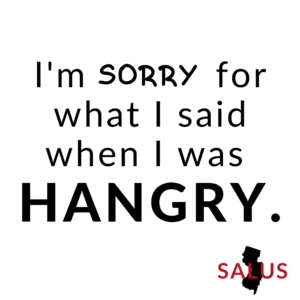Hangry? We’ve All Been There
Ever felt hangry?
If this word isn’t familiar to you, the feeling probably is. (I used to experience hanger a fair share when the kids were young, to be honest).
Have you ever snapped at someone right before dinner or when you were grocery shopping on an empty stomach? It’s possible you were having a bad day, but it could have been because you were hangry.
What is Hangry?
“Hangry” has actually been added to the Oxford English dictionary. If you go look it up you may see a picture of me circa 2010 with two infants demanding all of my energy and attention.
/ˈhaNGɡrē/
Adjective informal
Bad-tempered, irritable or angry as a result of feeling hungry.
Hungry + Angry=Hangry.
As in: “I get very hangry if I miss a meal which makes me want to bite someone’s head off.”
Yup, we’ve all been there before. That awful feeling when you are stuck between an early lunch and a late dinner. Hangry is a very real feeling. And it’s actually a signal from your brain.
S.O.S. Hangry is a Signal From Your Brain
When you go too long without food, we can reach the point when a perfectly pleasant person turns into an irritable monster. Oh, and our blood glucose levels start to drop making it harder to control our emotions. This can also trigger the release of stress hormones making it even harder to control anger and other other less than stellar symptoms including:
Mood Swings-
Low blood sugar levels can cause us to feel unusually irritated, anxious and moody.
It’s not just in your head.
A study published in the journal, Physiology and Behavior, found that low blood sugar induced a state of “tense-tiredness” that caused study participants to have more negative outlooks on certain life situations.
Feel like crying when you’re hungry? So do I.
Hulking Out-
Feeling the urge to lash out at your kids or friends when you’re normally calm, cool and collected?
You’re not alone.
Studies have shown that intimate partners are more likely to get angry with each other when their blood sugar levels were lower than normal. When we are hangry, nothing else matters.
Lack of Willpower-
When you’re beyond hungry, you might have a harder time sticking to your goals. Self control is compromised when glucose levels are low which can lead to impulse decisions and overeating.
For example, when you normally pass on the bread basket at dinner, if you’re hangry, you’re pretty much liking the plate clean.
Fatigue-
Being hangry can also result in fatigue, dizziness, headaches, foggy thinking, a decrease in motivation and just not feeling like yourself.
What the Science Says
So, why does this happen again? Why do we get so angry when we’re hungry?
We already know that glucose states get low when people are hungry. The brain requires glucose. If glucose is low, it doesn’t function properly. But, newer research states that ‘hanger’ might be more complicated than just a drop in blood sugar. It appears to be a complicated emotional response between biology, personality and environmental cues.
“Our bodies play a powerful role in shaping our moment-to-moment experiences, perceptions and behaviors – whether we are hungry versus full, tired versus rested or sick versus healthy. If you are feeling a little grumpy, take a step back and think about your emotions for a bit – it might help you from turning into a hangry mess.”
Hanger Management
Today’s questions aren’t quite as deep as the others but can have a profound impact on how you handle situations going forward to prevent this rollercoaster of blood sugar and emotions.
Have you ever felt hangry before? When and what symptoms did you experience?
What steps can you take to start listening to your body and give it what it needs to function at its best instead of ignoring important signs and ending up… Hangry?
Listen, I can empathize. Feeling out of control with our emotions is frustrating, especially when food is involved. But, thankfully, in most cases, hangry can be managed by making better food choices, focusing on quality, quantity and timing.
Quality-
Food quality matters. If you usually reach for processed carbohydrates like cereal for breakfast, your blood glucose levels probably tend to rise quickly which may lead to more extreme crashes later in the morning, leaving you hangry.
Want to avoid that rollercoaster?
It’s best to choose whole, nutrient dense foods that help you feel full longer and offer vitamins, minerals. Next time you’re in a mega-rush for breakfast, reach for something like a banana with a thumb portion of unsweetened almond butter and a hard-boiled egg.
Quantity-
Despite your lack of glucose driven hanger, don’t think you should just reach for a giant donut to fight off symptoms.
That will surely backfire.
As a general guideline, mix in a balanced portion of carbohydrates, protein and fat at each meal.
Timing-
Like our bodies, our brain also needs fuel to function properly. Don’t wait until you feel overly hungry to eat.
For many people, this means eating more frequent portions than the typical three meals a day. If you know you’re the type of person who is prone to feeling hangry, plan ahead and meal prep a small snack to have in a pinch.

Fight Off Hanger by Listening to Your Body
Get in tune with your body and the signals it is giving you rather than brushing it off. Body communication and awareness is key:
- Rest when you are tired.
- Eat when you are hungry.
- Move when you are stressed.
So, on a scale from one to #hangry, how ready are you get control and listen to your body and its cues? Once you do that, you’ll better manage your own chemical and hormonal reactions which will do wonders for your mind, body and spirit (and hanger-state).
Stay connected, friends.
More on our Salus Nutrition Coaching Blog:
This material is intended for informational use only and should not be construed as medical advice.
The post Hangry? We’ve All Been There appeared first on Salus.
Recent posts


QUICK LINKS
CONTACT
Phone
Address
1680 State Route 35 Middletown, NJ 07748
New Paragraph



